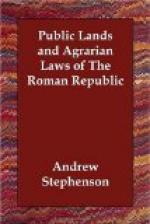[Footnote 3: App., I, 29; Plutarch, Marius, 29.]
[Footnote 4: Plutarch, Marius, loc. cit.]
[Footnote 5: App., Bell. Civ., I, 30-33.]
[Footnote 6: App., loc. cit.]
[Footnote 7: Aurelius Victor, 73.]
[Footnote 8: Cicero, De Orat., II, c. 7, I; pro Balbo, XIV; pro Rabirio, XI.]
[Footnote 9: Long, I.]
[Footnote 10: Cicero, Pro Rabirio, 9.]
[Footnote 11: Val. Max., VIII, 1, Sec.2: “Sext. Titius... agraria lege lata gratiosus apud populum.”]
[Footnote 12: De Legibus, II, 6. De Orat., II, 11.]
[Footnote 13: Ihne, V, 176-186; App., I, 35; Val. Max., IX, 5, 2: Cicero, De Orat., III, 1; Livy, Epit., 71.]
SEC. 15.—EFFECT OF THE SULLAN REVOLUTION.
As soon as Sulla found himself established, he caused a bill to pass the Comitia Centuriata by means of which he was empowered to inflict punishment upon certain Italian communities. For the accomplishment of this purpose commissioners were appointed to cooeperate with the garrisons established throughout all Italy. The less guilty were required to pay fines, pull down their walls, and raze their citadels.[1] Those that had been guilty of continued opposition, as Samnium, Lucania, and Etruria, had their territory in whole or in part confiscated, their municipal rights cancelled, immunities taken from them, which had been granted by old treaties, and the Roman franchise,[2] which they had been granted by the Cinnan government, annulled. Such persons received, instead, the lowest Latin rights which did not even imply membership in any community and rendered them destitute of civic constitution and the right of making a testament.[3] This latter treatment applied only to those whose land was confiscated. Thus Sulla vindicated the majesty of the Republic and at the time avoided furnishing his enemies with a nucleus in Italian communities. In Campania, the democratic colony established at Capua by Cinna[4] was done away with and the domain given back to the state, thus becoming ager publicus. The whole territory of Praeneste and Norba in Latium, and Spoletium in Umbria was confiscated. The town of Sulmo in Pelignium was razed. But more direful than all this was the punishment which fell upon Etruria[5] and Samnium. These people had marched upon Rome and, with the avowed determination of exterminating the Roman people, had engaged in battle at the Colline gate. They were utterly destroyed and their country left desolate. The territory of Samnium was not even opened up for settlement, but left as a lair for wild beasts. Henceforth from the Rubicon to the Straits of Sicily there were to be none but Romans; the laws and the language of the whole peninsula were to be the laws[6] and the language of Rome.




